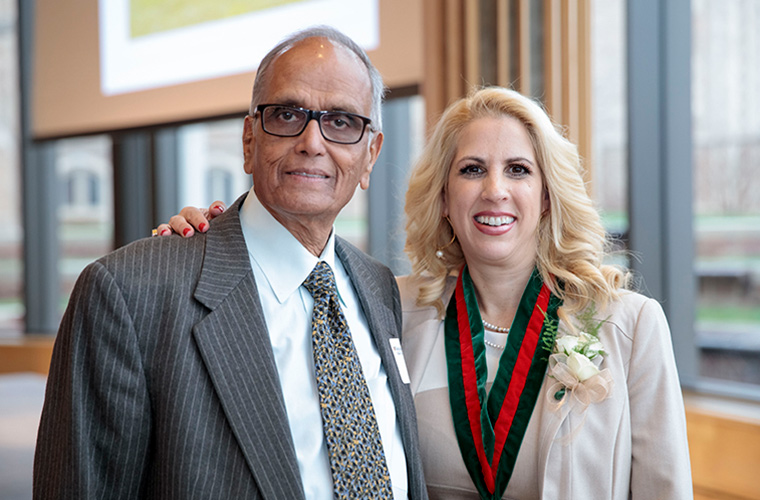Michal Grinstein-Weiss, PhD, was installed as the Shanti K. Khinduka Distinguished Professor on April 2 before an audience of colleagues, collaborators, supporters and family members, including many from her native Israel.
“In addition to being an internationally renowned scholar of social and economic development, Professor Grinstein-Weiss is an influential and truly significant leader in health behavior change,” said Chancellor Mark S. Wrighton at the ceremony, which had to be moved from Brown Lounge to the Clark-Fox Forum to accommodate the crowd.
Grinstein-Weiss serves as the associate dean for policy initiatives, director of the Envolve Center for Health Behavior Change and associate director of the Center for Social Development (CSD) at the George Warren Brown School of Social Work.
“I am deeply honored and sincerely grateful to be named as the Shanti Khinduka Distinguished Professor,” she said. “Dean Khinduka is not only a role model and a career hero for me but also was my first dean when I moved from Israel to the U.S. to pursue my PHD.”
Shanti Khinduka
Khinduka, who traveled from Texas to participate in the ceremony, was dean of the Brown School from 1974 to 2004 and was a leader in establishing the Brown School as a top-tier center for social work research and evidence-based practice. Enola Proctor is the outgoing holder of the distinguished professorship.
The professorship was established in 2002 by a donor who wished to remain anonymous. For Grinstein-Weiss’ installation, however, Wrighton received permission to name the donor: Roma Wittcoff, an emeritus member of the Washington University in St. Louis’ Board of Trustees, a 1945 graduate of the Olin Business School and a longtime friend to the Brown School.
Grinstein-Weiss said her first mentor was her mother, a social worker. (She watched her daughter’s installation remotely, from Israel.)
“My mom was the person who got me interested in social work and about caring for vulnerable populations,” Grinstein-Weiss said. Her father was a Holocaust survivor. “One of the biggest disappointments in my father’s life was not having the opportunity to pursue a formal education,” she said. “My father talked to me about the importance of education every single day.”
Brown School Dean Mary McKay noted that Grinstein-Weiss leads successful research collaborations “across industry, government, and philanthropic partners, including Fortune 500 companies, major foundations, and government agencies, and her work has reached globally in its impact.”
‘Synergy in Action’
Grinstein-Weiss presented “Synergy in Action: Addressing Inequities Through Academic, Industry, and Government Partners.”
“One of the secrets for making an impact is connecting innovative ideas with strong partnerships,” she said. She discussed her work in three areas: Child Development Accounts in Israel, tax-time saving in the U.S., and health equity.
“So why did I think Israel was the right place to implement this Child Development Account policy? Because Israel has one of the highest levels of income and wealth inequality,” she said, with nearly 30 percent of children living in poverty.
Over several years, Grinstein-Weiss worked with Israeli leaders to implement Child Development Accounts. The accounts allow children to accumulate savings for post-secondary education, homeownership or business initiatives. In November 2015, Israel’s parliament passed a law to adopt the accounts, based on a proposal by Grinstein-Weiss and rooted in years of research by CSD Policy Director Margaret Clancy and Grinstein-Weiss’ mentor Michael Sherraden, founding director of CSD.
Grinstein-Weiss also discussed tax-time savings, specifically Refund to Savings (R2S), the largest saving experiment conducted in the United States to date. R2S is a collaboration of academic researchers and tax industry experts from CSD, Duke University and Intuit Inc., the maker of TurboTax tax preparation software.
“We’ve found that for low-income households in our population, the tax refund is 2.1 times what they spend on housing each month and equal to about 1.3 months’ worth of income,” Grinstein-Weiss said. “So this is why we developed the Refund to Savings initiative: to help low-income families save their refund.”
The research tests principles of behavioral economics integrated into the tax process and tests various messaging strategies to understand how to encourage people to save. The interventions from 2013-2017 resulted in nearly $100 million more dollars being deposited into savings vehicles, Grinstein-Weiss said.
“From the R2S initiative, we learned the promise of academic-industry collaborations and the high relationship between poverty and health outcomes,” she said. “This led us to the next area of work and a new industry-academic partnership.”
Grinstein-Weiss launched the Envolve Center in January 2016 with collaborators Centene Corp., which is the largest Medicaid managed care organization in the U.S., and nationally known researchers in public health, behavioral economics and social work at Washington University in St. Louis and Duke University. They work together to test evidence-based scientific innovations in real-world settings, with a focus on vulnerable populations.
Since the center’s launch, they have conducted 29 field experiments and studies in 12 states, covering such topics as childhood obesity, asthma and food insecurity.
Dean McKay said Grinstein-Weiss’ record of scholarship and passion for research make her “an exceptional fit” for the distinguished professorship.
